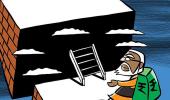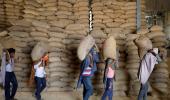The rising goods and services tax (GST) and personal income-tax collections may bolster the Narendra Modi government's ability to announce new schemes or enhance existing ones, reports Indivjal Dhasmana.

State election results may provide a template for the Narendra Modi government in the upcoming national elections, with freebies or social welfare schemes likely to feature in the interim Budget for 2024-25.
The rising goods and services tax (GST) and personal income-tax collections may bolster the Narendra Modi government's ability to announce new schemes or enhance existing ones, such as increasing allocations to Pradhan Mantri Kisan Samman Nidhi (PM-Kisan), women, youth, and deprived sections-related schemes, tax cuts on petrol and diesel, additional funds to Mahatma Gandhi National Rural Employment Guarantee Act, and further reductions in liquefied petroleum gas (LPG) cylinder prices.
Despite a decline in tax collections from corporation tax, central GST, Union excise duty, and Customs duty in October before devolution to the states, overall tax receipts rose by around 14 per cent to Rs 18.3 trillion during April-October of 2023-24 (FY24), surpassing the Rs 16.1 trillion recorded during the corresponding period of 2022-23.
This exceeded the 10.44 per cent growth in tax collections projected in the Union Budget for FY24.
The effective containment of the fiscal deficit in the first half of FY24 provides the government with leverage to announce pro-people schemes in the interim Budget.
The Centre has reined in its fiscal deficit at 4.9 per cent of gross domestic product (GDP) during the first half of FY24.
The Budget projected the deficit at 5.9 per cent of GDP for the entire FY24.
The deficit stood much higher at 6.4 per cent of GDP in the first quarter (Q1) but was effectively checked at 3.5 per cent in the second quarter (Q2).
A part of the reason was a higher deficit at Rs 4.5 trillion in Q1 than Rs 2.5 trillion in Q2, as well as less growth of GDP at current prices at 8 per cent during April-June than 9.1 per cent during July-September.
However, GDP growth at current prices in each quarter was less than the 10.5 per cent assumed in the Budget for FY24.
More recently, GST collections surged by 15 per cent year-on-year in November -- the steepest for any month of this financial year -- to Rs 1.68 trillion.
Of this, the central GST collection, after settlement from integrated GST, rose by 14.4 per cent to Rs 68,297 crore in the month.
The Centre has already announced the extension of the free foodgrain scheme for over 800 million people for the next five years, incurring an expenditure of Rs 11.8 trillion.
However, the burden on the exchequer would be an additional Rs 6,000 crore for the fourth quarter of FY24 from the scheme, which was to end by December 31 earlier.
Economists caution authorities, both at the Centre and in states, against reckless freebies.
For instance, India Ratings & Research chief economist Devendra Pant said Indian public finances, both central and state, suffer from the rigidity of expenditure.
"Higher proportion of interest payments, salary, and pension payments in current expenditure/revenue makes expenditure reforms difficult. State capital expenditure (capex) is strongly correlated to the revenue deficit position," he pointed out.
Pant said populous schemes exert pressure on the fiscal position of states and the Union government.
"The government's current spending disproportionate to its current revenue is likely to hurt capex, increasing debt leading to constant pressure on their fiscal position," he warned.
The Centre's debt is projected to rise to 57.2 per cent of GDP in the current financial year from 57 per cent in the previous financial year.
Government liabilities in each of these two years were more than that since 2009-10, except the pandemic-hit years of 2020-21 and 2021-22 (over 60 per cent).
The Centre's debt may come down this year compared to projections in the Budget if it maintains the first half's trend of containing fiscal deficit in the second half of the year too.
The Bharatiya Janata Party (BJP) has promised various programmes and schemes in the three states it won.
For instance, it promised to increase income support under PM-Kisan to Rs 12,000 per eligible farmer in Rajasthan.
Similarly, it promised an LPG cylinder at Rs 500 in Chhattisgarh.
Its victory in Madhya Pradesh despite around 20 years of incumbency is largely attributed to the Mukhyamantri Ladli Behna Yojana, a women-oriented scheme.
The repercussions of all these schemes and promises might be seen at the central level too.
On the impact of the state poll results on central programmes and schemes, Gopal Krishna Agarwal, national spokesperson for BJP for economic affairs, said announcing new schemes is not a moot issue.
It is the delivery of the schemes and Modi's guarantees that have caught the people's imagination.
"The Opposition did not have any road map for its promises. Schemes promised by it were false. We focused on delivery. People knew that those were Modi's guarantees which would be fulfilled. People have recognised the difference between ours and the Opposition's promises," he said.
He said Prime Minister Modi has already launched the Viksit Bharat Sankalp Yatra -- one of the objectives of which was to connect existing schemes with those who have not received benefits despite eligibility.

Feature Presentation: Aslam Hunani/Rediff.com











